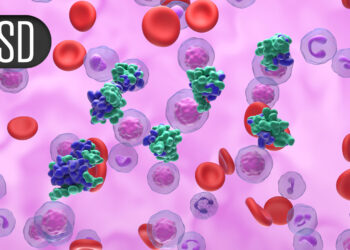Another phase 3 trial has demonstrated the effectiveness of the dual-neurokinin receptor antagonist elinzanetant in controlling hot flashes in women on adjuvant endocrine therapy for hormone receptor-positive (HR+) breast cancer. This time, the sample included younger and older patients with less frequent and severe episodes than patients in the previously published trials had experienced.
“Elinzanetant is the first neurokinin-targeted therapy to demonstrate efficacy in reducing vasomotor symptoms (VMS)” — otherwise known as hot flashes — “in women with breast cancer,” Fatima Cardoso, MD, MSc, said as she presented results from the OASIS 4 trial at the breast cancer oral abstracts session at the American Society of Clinical Oncology (ASCO) 2025 annual meeting.
“The effect [of the hormone-free dual neurokinin-1 and -3 receptor antagonist] is rapid at week 1,” Cardoso said. “It is sustained throughout the duration of the study. It is also well-tolerated, which supports its use long term.” Trial results were also published simultaneously in The New England Journal of Medicine.
“It is important to treat VSM because they can negatively impact quality of life and lead to women prematurely stopping their breast cancer treatment,” Cardoso, director of the breast cancer unit at the Champalimaud Cancer Center and president of the ABC Global Alliance in Lisbon, Portugal, told Medscape Medical News.
VMS Reduction Advantage Sustained for 12 Weeks
OASIS 4 enrolled 474 women aged 18-70 years who were receiving endocrine therapy for HR+ breast cancer or as prevention in those at high risk for breast cancer and had 35 or more moderate-to-severe vasomotor symptoms a week. The trial assigned 316 participants to receive elinzanetant 120 mg daily for 52 weeks and 148 to receive a placebo daily for 12 weeks followed by elinzanetant 120 mg daily for 40 weeks. The average daily VMS frequency was 11.4 in the elinzanetant group and 11.5 in the placebo group. All participants were evaluated for 4 weeks after a year of treatment.
Reductions in frequency of VMS were observed after 1 week of treatment, Cardoso said. The mean daily number of episodes was reduced by four in the patients receiving elinzanetant and 1.8 in those receiving placebo. By week 4, the daily reductions in VMS were 6.5 and 3.0 in the two groups, respectively. By week 12, the patients receiving elinzanetant had almost twice the reduction in overall frequency of VMS: 7.8 vs 4.2 fewer average daily episodes than baseline, respectively.
Cardoso also noted “a substantial improvement” in reducing the severity of VMS in patients receiving elinzanetant.
She characterized the safety profile of elinzanetant as favorable, during her interview with Medscape Medical News.
“Most side effects were mild, and the most common were headache, fatigue, and somnolence,” she said. “Very low rates of serious side effects were seen.”
During the placebo-controlled period, the rates of treatment-emergent adverse events (TEAEs) were 70% in the patients receiving elinzanetant and 62% in the placebo group. Fewer TEAEs were reported in both groups after the 12-week placebo period ended, she said.
Elinzanetant “was very well tolerated,” Cardoso said as she presented the results. “Perhaps the best factor to say that it was well tolerated and efficacious is that over 90% of the patients decided to go into the 2-year extension phase.”
How OASIS 4 Compares With Other Elinzanetant Trials
The OASIS 4 results are consistent with other phase 3 trials of elinzanetant in women on adjuvant endocrine therapy with VMS, JoAnn Pinkerton, MD, director of midlife health at the University of Virginia in Charlottesville, Virginia, told Medscape Medical News. Pinkerton was principal investigator of the OASIS 2 randomized trial of elinzanetant in postmenopausal participants with more frequent and severe VMS symptoms than those in OASIS 4.
“It is worth noting that the treatment did not have any adverse effects on the endometrium, and there were no significant changes in bone density that were not expected due to aging,” Pinkerton said.
OASIS 4 is significant because it enrolled patients from 90 international sites, including Europe and Canada, and well as women aged 18-70 years with 35 or more moderate-to-severe VMS a week while on tamoxifen or aromatase inhibitors, Pinkerton added.
“OASIS 4 showed significant relief in menopausal symptoms in women with breast cancer, precisely the population that needs an effective, Food and Drug Administration-approved medication to treat their bothersome menopausal symptoms,” Pinkerton said.
The trial was funded by Bayer. Cardoso reported financial relationships with Amgen, Astellas Pharma, AstraZeneca, Bayer, Celgene, Daiichi Sankyo, Eisai, GE Healthcare, Genentech, Gilead Sciences, GlaxoSmithKline, IQVIA, Macrogenics, Merck Sharp & Dohme, Merus, Mundipharma, Mylan, Novartis, Pfizer, Pierre Fabre, Prime Oncology, Roche, Samsung Bioepis, Sanofi, Seagen, Teva and touchIME. Pinkerton reported having financial relationships with Bayer, Pfizer, and Merck.
Richard Mark Kirkner is a medical journalist based in Philadelphia.
Source link : https://www.medscape.com/viewarticle/does-elinzanetant-reduce-vms-younger-patients-hr-breast-2025a1000h8t?src=rss
Author :
Publish date : 2025-06-27 08:21:00
Copyright for syndicated content belongs to the linked Source.









